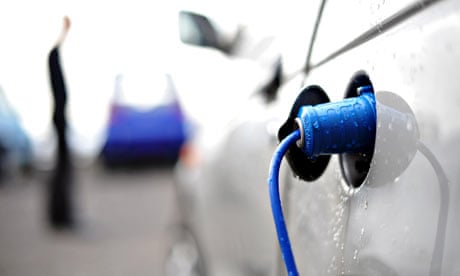Sales of new electric cars in the UK plummeted by nearly 90% in 2009 compared with their peak in 2007, according to motoring trade association figures released this week.
Just 55 of the green cars – whose fans include Boris Johnson, Jonathan Ross and Jade Jagger – were registered in 2009, in contrast to 397 in 2007, says the Society of Motor Manufacturers and Traders.
The huge fall is a blow to UK efforts to meet tough carbon emission cut targets in a decade, and comes just months before the government introduces a subsidy of up to £5,000 off new electric cars.
Nearly half of the electric vehicles sold last year were the tiny G-Wiz car. The latest model has a top speed of 50mph and a range of 48 miles between charges.
Rudi Schogger, managing director of Goingreen, which distributes the G-Wiz in the UK, said: "Some people might be waiting for the government grants to arrive before purchasing an EV." He added that, even with a grant, most of the new vehicles on the market will be more expensive than a G-Wiz.
Although sales of all new cars fell sharply in 2009 due to the recession, the drop in new registrations for electric cars was around eight times higher. Overall, 2m new cars were registered in 2009, the lowest level since 1995.
Richard Dyer, transport campaigner at Friends of the Earth, said: "The number of electric car sales are certainly disappointing. It could well be down to the recession, and the fact that they are priced at a premium over normal cars. But the government grant in January should mean a change in the fortunes of electric cars."
In January, the coalition will begin offering up to £5,000 towards the price of a series of newly launched electric cars, as part of a subsidy announced by the former Labour government. The Department for Transport (DfT) anticipates around 8,600 of the cars will be sold in the first year of the scheme. The government has so far committed £43m for the scheme to run until March 2012, with a review taking place in January 2012, but in yesterday's spending review it talked of "supporting consumer incentives for electric and other low-emission cars throughout the life of this parliament," suggesting the subsidy would continue after March 2012 though possibly at a lower rate.
New electric models coming next year include the £28,900 four-seater Mitsubishi iMiEV, a right-hand drive version of the unpriced Norwegian-made Th!nk City and the £28,350 Nissan Leaf, which Nissan claims is "the first mass-market electric car" and will be built in Sunderland from 2013. The G-Wiz's low speed and range means it is not eligible for the grant scheme.
A DfT spokesperson said: "We want to see as many as possible of this next generation of cars on our roads – but we know that there will be limited numbers of eligible cars available in the early months, and we will have to see how the market reacts."
The rollout of electric cars in the UK is also dependent on a network of charging points to power them – most of the cars have a battery range of no more than 100 miles. A government plan to build 13,500 such charging points has yet to be confirmed, although the spending review yesterday said the government was committed to "supporting electric car charging infrastructure."
Several cities are vying to be the most friendly for electric cars. London is in the lead with several hundred charging points. Brighton & Hove plans to install 16 charging points before the end of this year, but there are reportedly only three electric cars in the city so far.
Separately this week, London mayor, Boris Johnson, confirmed new rules for the city's congestion charge that will allow cars a 100% discount based on low CO2 emissions, rather than simply using hybrid or electric technology. Johnson said cars will be exempt if they emit less than 100g/km of carbon dioxide and meet the highest air quality standard, "Euro 5". Such a move will mean more than 60,000 owners of hybrid cars – such as the first generations of the Toyota Prius – will soon have to pay the £8 charge (set to rise to £10 in January), from which they were previously exempt.
The switch means the many low-carbon diesel cars on the market will be eligible for the discount. There are at least 19 models currently available below 100g/km CO2, from manufacturers including Volvo, Citroen, Volkswagen, Seat and Ford. But environmental campaigners have warned that while the mayor's Euro 5 criteria tackles the problem of harmful particulates (PM10s) from diesel cars, the level of nitrous oxide is three times that of petrol equivalents.

Comments (…)
Sign in or create your Guardian account to join the discussion